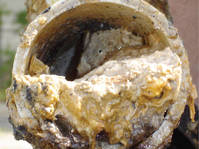
If you've never heard of the term 'fatberg', you aren't alone. The term has been making the global news rounds as large quantities of fats, oils, and grease (FOG) are discovered accumulated throughout city sewer systems. Just this past week, a massive fatberg in Baltimore was the cause of an almost 1 million gallon stream of sewage being suddenly released into a Maryland stream causing overflows and local flooding. And earlier this month a truly colossal fatberg weighing more than 140 tons was discovered near Whitechapel Road in London.
What is a fatberg?
The fats, oils, and grease released by restaurants and households have combined with disposable wipes, paper products, diapers, etc to create an underground monstrosity that is clogging pipes at an alarming rate. Once discovered, these entities need to be dealt with by crews of city workers dedicated to breaking them apart. However, as restaurants and households continue to dispose of fats, oils, grease and paper products using unsafe and unsanitary methods, these fatbergs will continue to develop.
How can my restaurant help prevent fatbergs?
Your traditional cleaning methods may include pouring fats, oils, and grease directly down the drain (a major environmental code no-no) or you may clean your filters and cooking equipment in the back of your restaurant using high powered sprayers. You may think that by avoiding the obvious drains in your establishment that you are being safe; however, most of the backyard cleanings that go on end up running into ground water or public drainage systems, enabling the fatberg-producing materials to still find their way into the main waterways.
In order to prevent this entirely, consider contracting with services which remove your filters entirely to then clean them in special, separate facilities. Even the use of specialized, controlled chemicals can go a long way in keeping these dangerous and disgusting entities out of the main water supply. Help your community and the environment by avoiding fatberg-producing practices and look for commercial kitchen cleaning companies that can take care of your hood filters and grease traps in the most environmentally friendly ways possible.
In order to prevent this entirely, consider contracting with services which remove your filters entirely to then clean them in special, separate facilities. Even the use of specialized, controlled chemicals can go a long way in keeping these dangerous and disgusting entities out of the main water supply. Help your community and the environment by avoiding fatberg-producing practices and look for commercial kitchen cleaning companies that can take care of your hood filters and grease traps in the most environmentally friendly ways possible.

 RSS Feed
RSS Feed